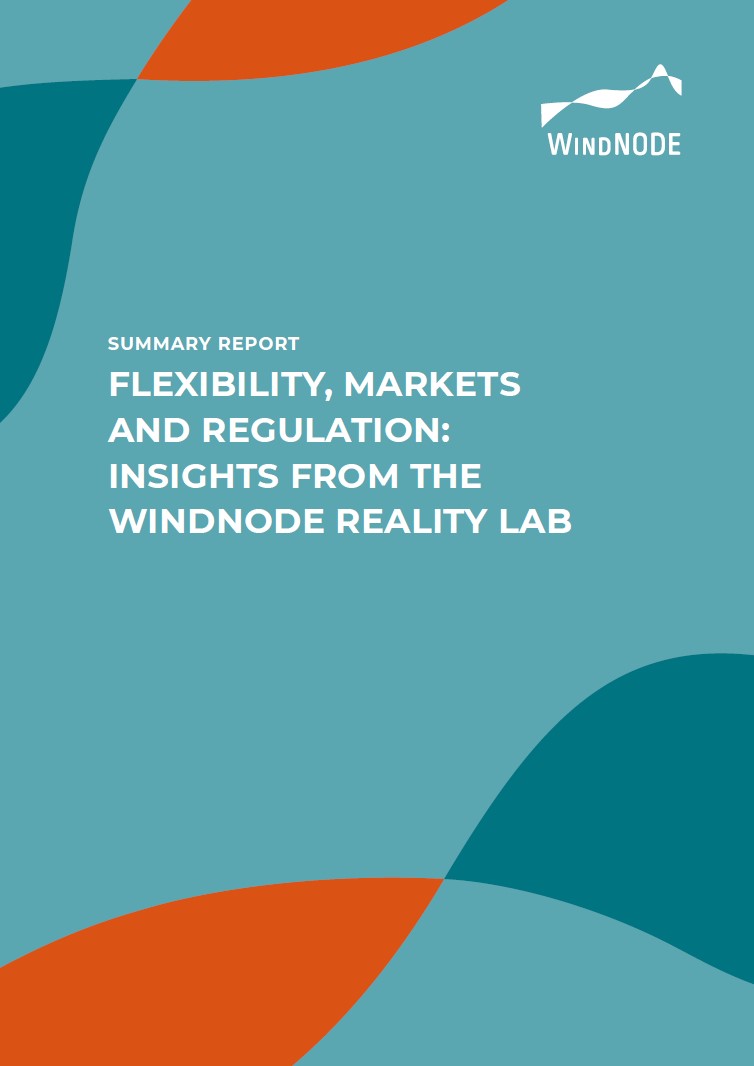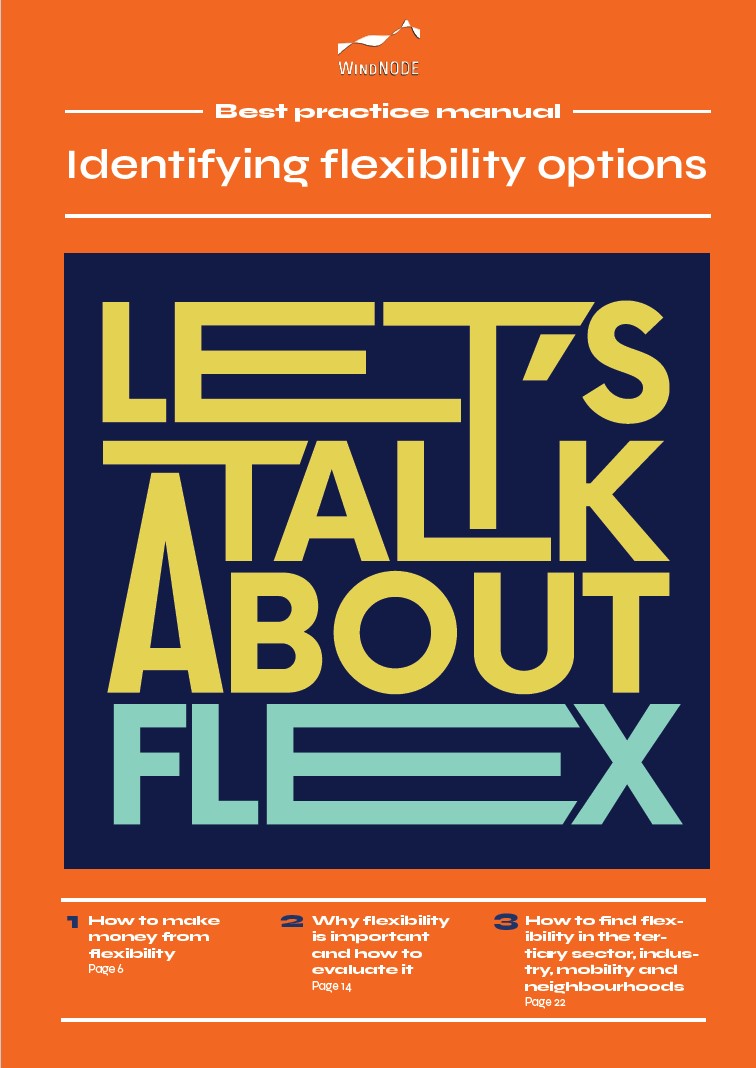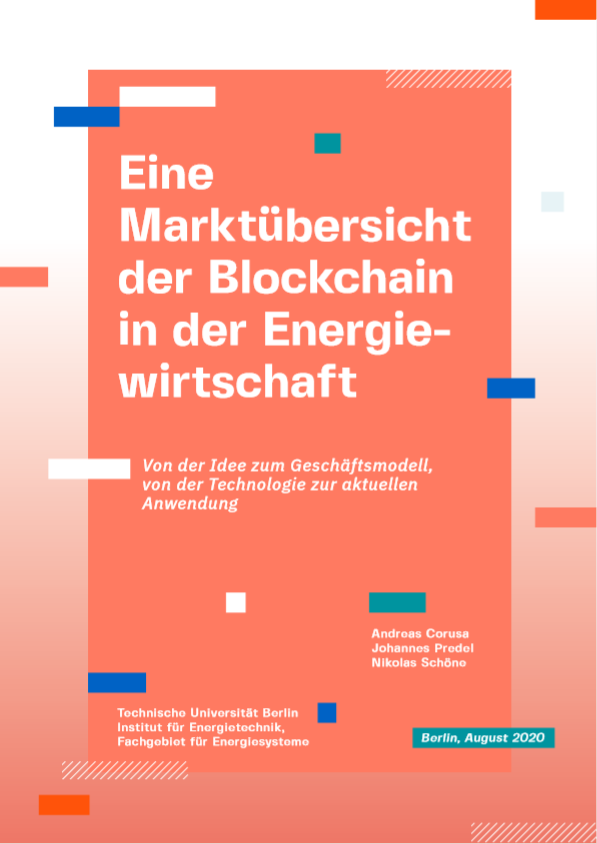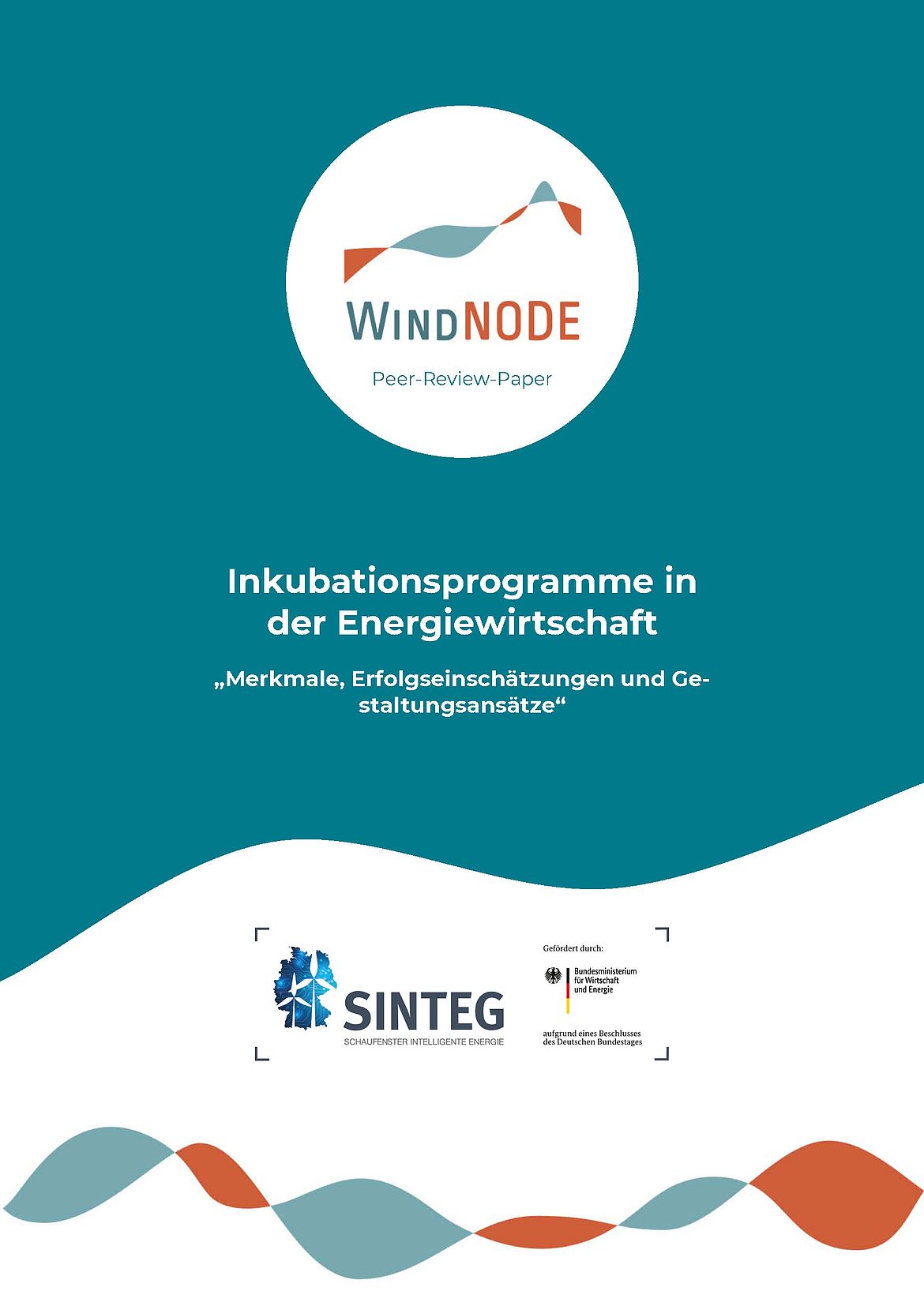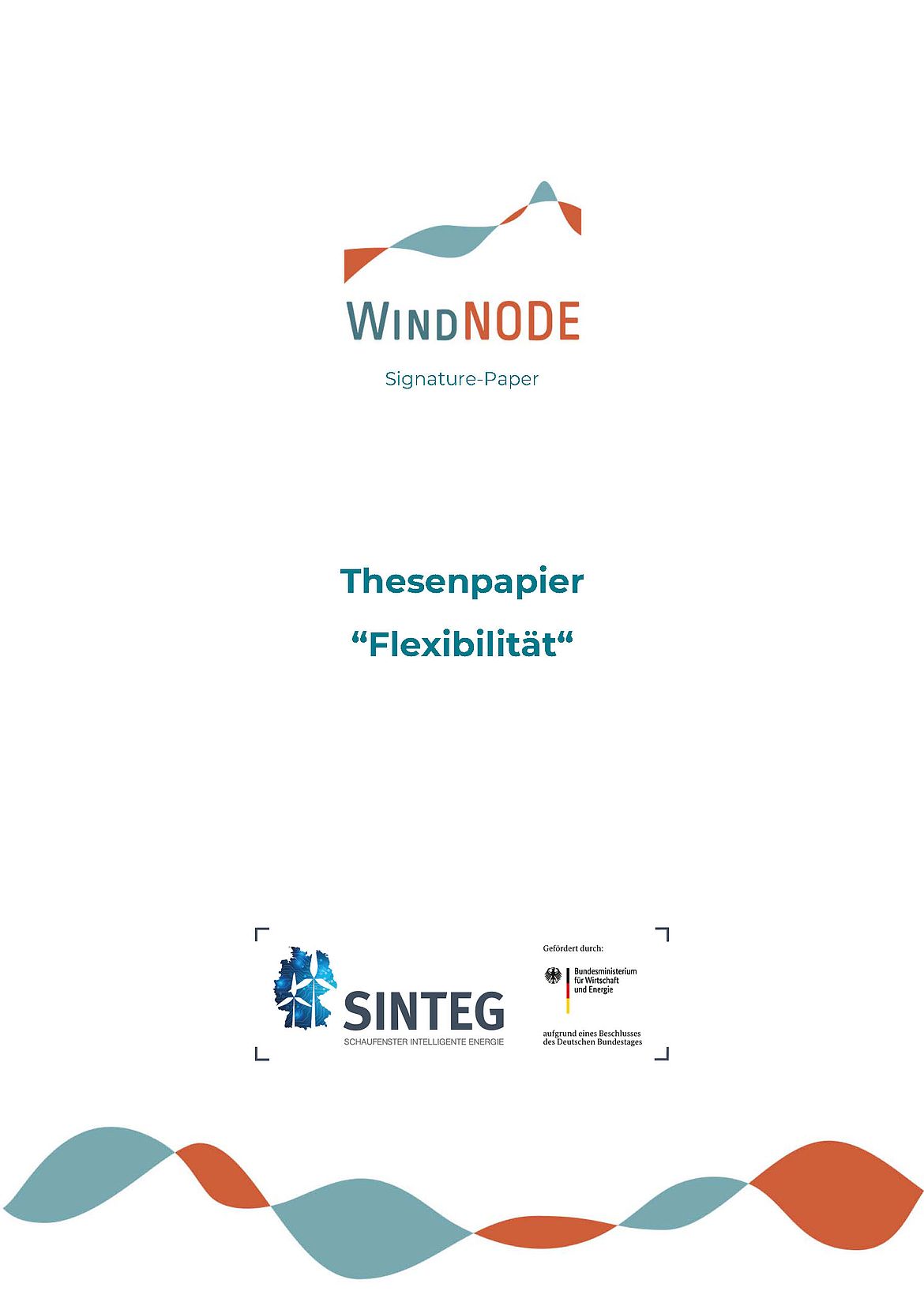Partner papers were written by a single institute, i.e. elaborated unilaterally. The corresponding texts were not necessarily coordinated with other WindNODE partners prior to publication. The quality was assured by the authors/institution or if necessary by an external editor. Partner papers were published in the layout of the respective institute.
Peer review papers are unilaterally elaborated documents that have undergone a WindNODE-internal quality assurance process in the form of a peer review by other WindNODE partners. The partners provided expert feedback on the document, which was taken into account. Peer review papers were published in the original layout of the institute and provided with a uniform WindNODE jacket, also published here.
Signature papers were elaborated in the scope of the WindNODE Coordinating Committees and were intended for the higher-order merger of the findings of the partner project. The Coordinating Committees performed continuous quality assurance and coordination of the documents. Signature papers were published in a WindNODE jacket.
Signature Paper: Summary report – Flexibility, markets and regulation
The summary report "Flexibility, markets and regulation: Insights from the WindNODE reality lab" is the third product of the internal synthesis of results after the "Best practice manual: Identifying flexibility options" and the WindNODE report 2020, and takes the different name-giving perspectives on renewable energy integration. In addition to the concrete use of flexibility options in practice, the theoretical flexibility potential in the WindNODE region is presented, new market-based mechanisms for flexibility procurement for grid congestion management are presented, and the regulatory framework is analyzed and reviewed for further development. The report addresses in particular the marketing options of flexible generators and consumers and highlights challenges and opportunities at the low voltage level, against the background of a further decarbonizing society.
Signature paper: Best practice manual - Identifying flexibility options
The "Best practice manual: Identifying flexibility options" is the first comprehensive product in the process of synthesis of results in WindNODE. It focuses on the individual identification and use of flexibility in organizations and companies. Individual tangible, concrete case studies of the WindNODE partners shine a light on successfully implemented application practices and processes of project work and invite to imitate them. The best practice manual thus serves as an important guide on the way to an intelligent energy system, and helps to optimize the integration and use of renewable energy from the residential area to the factory, while adjusting demand to the availability of local renewable energy.
Peer review paper: Multicriteria assessment of energy transition paths
Within WindNODE, the Department of Energy Systems of the TU Berlin developed a set of indicators which allow a multicriteria assessment of model-based energy transition paths. The indicators cover the dimensions of cost efficiency, security of supply as well as environmental and social sustainability. They are applied to three different scenarios for energy transition: A basic scenario, an efficiency scenario with a focus on technologies reducing the power and heat demand, and a scenario with a faster switch from combustion engines to electric vehicles. The comprehensive analysis reveals the different strengths and weaknesses of the scenarios and enables a differentiated assessment of options that do not have the minimal costs but could lead to significant improvements in other dimensions.
Peer review paper: A market overview of the Blockchain in the energy industry
The study "A market overview of the Blockchain in the energy industry", prepared by the Department of Energy Systems at the TU Berlin within the joint-project of WindNODE, divides the Blockchain technology into technical modules and classifies existing Blockchain solutions on the basis of the methodology developed. Starting point of the study is a profound market analysis of the current use of the blockchain in the energy sector. The study is an important guide for the applicability of the technology and helps in decision-making and comparability of possible business models. The study comes to the conclusion that there are still a large number of block chain projects along the energy industry value chain, but without offering an all-encompassing block chain solution, which, as often assumed in advance, disrupts the energy industry. Instead, individual modules or special features of the Blockchain (e.g. smart contracts) have the potential to support very specific, tailor-made solutions.
Peer review paper: Contribution of Information and Communication Technology to the Intelligent Energy System
Within WindNODE, the Department of Energy Systems of the TU Berlin conducted the peer review paper "Contribution of Information and Communication Technology to an Intelligent Energy System". The authors examined to what extent ICT enables a more efficient management of specific energy system related challenges. The analysis focuses on the identification and activation of new flexibility options, the expansion of network congestion management and predictive maintenance as part of an intelligent maintenance and investment planning of energy infrastructure. The analysis shows that ICT can improve individual dimensions of the energy policy triangle without compromising other areas, thus making a positive contribution to achieving an intelligent energy system.
Peer review paper: Market design, regulation and overall efficiency of flexibility in the power system
The WindNODE peer review paper “Market design, regulation and overall efficiency of flexibility in the power system” describes the status quo of the interaction between power market and grid as well as the legal framework regarding the activation of flexibility for the electricity system. Furthermore, using a practical example, the challenges in exploiting the flexibility of industrial processes are outlined. Furthermore, the quality effect of flexibility on the overall system is analysed, focussing on the consideration of industrial end consumers.
Peer review paper: incubation programmes in the energy industry
In the scope of WindNODE, the Borderstep Institute for Innovation and Sustainability, in cooperation with Berlin Partner for Business and Technology studied so-called incubation programmes to promote start-ups in the field of the Green Economy. For the study, 12 programmes with 18 sites in total were identified in seven federated states which have funding priority in the Green Economy sector. Among other things, the study shows that Berlin is the start-up capital of Germany and has the most incubation programmes in the field of energy. In addition, the study works out success factors for effective incubation programmes.
Signature paper: “Flexibility” thesis paper
The WindNODE signature paper on “flexibility” was written after the synthesis of findings in the field of action “Flexibilities, Market and Regulation”. The presented theses reflect the position of relevant WindNODE players on central issues of today’s debate about flexibility. In the further course of the project, the six theses presented here will be studied and substantiated individually and in more detail.
Partner-Papers
The following list contains some of the scientific publications that have been published by WindNODE partners during the project.
Date | Reference | Partner | Workstream | Link | |
|---|---|---|---|---|---|
03/16 | Markert, Peters, Wessolek (2016): "Analysis of the evaporation method to obtain soil thermal conductivity data in the full moisture range". In: Soil Science Society of America Journal, Vol 80, No 2, pp. 275-283, March/April 2016. | 3.3c | |||
04/17 | Wessolek, Trinks, Kluge, Bohne, Markwardt (2017): "Bewertung der Bodenerwärmung durch Erdkabeltrassen". In: Tagungsband Wissenschaftsdialog 2016, pp. 72-91, Bundesnetzagentur, Bonn, April 2017. | 3.3c | |||
05/17 | Beucker (2017): "Vorhaben ProSHAPE: Optimierung von Energiekosten im Quartier durch dezentrales Energiemanagement". In: Jürgen Pöschk (Ed.), Energieeffizienz in Gebäuden - Jahrbuch 2017, VME Verlag und Medienservice Energie, Berlin, May 2017. | 8.2 | |||
06/17 | Graupner, Behnert, Reichelt, Kühne, Bruckner (2017): "Transmission grid stabilization using virtual power plants". In: 14th International Conference on the European Energy Market (EEM), Dresden, June 2017. | 5.2 | |||
06/17 | Maeding (2017): "Intelligente Messsysteme: Vernetzte Endkunden und sichere Kommunikation". In: Nicole Egert (Ed.), Innovation. Integration. Intelligent. Auf dem Weg in die Energiewirtschaft 4.0, p. 265, EW Medien und Kongresse GmbH, Berlin, June 2017. | 4.3 | |||
07/17 | Stimm (2017): "Leistungsfluss-Modellierung und Szenarien des deutschen Übertragungsnetzes basierend auf Open-Data". Master's thesis at the Fachgebiet Energieversorgungsnetze und Integration Erneuerbarer Energien (SENSE), Technische Universität Berlin, Berlin, July 2017. | 3.1 | |||
08/17 | Hommel (2017): "Experiences from an e-mobility project in a local power grid with redox-flow energy storage system". In: IEEE, San Francisco, August 2017. | 8.1 | |||
09/17 | Markert, Bohne, Facklam, Wessolek (2017): "Pedotransfer-functions of soil thermal conductivity for the textural classes sand, silt and loam". In: Soil Science Society of America Journal, 2017. | 3.3c | |||
10/17 | Safarik (2017): "Regenerative Energien: Neue Möglichkeiten durch Flüssigeis". In: Wirtschaftsbild Spezial: Moderne Gebäudetechnik 2017, p. 23, Union Betriebs-GmbH, Rheinbach, October 2017. | 6.2 | |||
10/17 | Steffan, Heinrich, Safarik, Honke (2017): "Highest Efficiency Ice Storage for Solar Cooling Systems – Experiences with a Vacuum Ice Slurry Cold Thermal Energy Storage". In: International Conference on Solar Heating and Cooling for Buildings and Industry, Abu Dhabi, October/November 2017. | 6.2 | |||
11/17 | Hempel, Fischer, Veit, Hommel, Kretz, Dziurzik, Bodach (2017): "Energiewende im Niederspannungsnetz – Modellregion Zwickau". In: International ETG Congress 2017 Die Energiewende – Blueprints for the new energy age, pp. 538-543, Bonn, November 2017. | 8.1 | |||
11/17 | Pelzer, Richter, Lombardi, Komarnicki (2017): "Energy intensive industry as the backbone for demand side flexibility”. In: International ETG Congress 2017 Die Energiewende – Blueprints for the new energy age, pp. 611-616, Bonn, November 2017. | 7.3 | |||
02/18 | Schabel, Fichter (2018): "Inkubationsprogramme in der Energiewirtschaft. Merkmale, Erfolgseinschätzungen und Gestaltungsansätze". Borderstep Institut, Berlin, February 2018. | 9.3, 8.2 | |||
03/18 | Doderer, Steffensen, Schäfer-Stradowsky (2018): "Power to Heat – Eine Chance für die Energiewende". White Paper, IKEM – Institut für Klimaschutz, Energie und Mobilität, Berlin, March 2018. | 5.2 | |||
03/18 | Behnert, Bruckner (2018): "Causes and effects of historical transmission grid collapses and implications for the German power system". In: Institute for Infrastructure and Resources Management (IIRM), University of Leipzig, Leipzig, March 2018. | 5.2 | |||
04/18 | Bender-Saebelkampf (2018): "Short-Term Load Forecasting of Residential Electricity Consumption Using Convolutional Neural Networks". Master's thesis at the Distributed Artificial Intelligence Laboratory, Technische Universität Berlin, Berlin, April 2018. | 8.2 | |||
04/18 | Berardo (2018): "Integrating Flexibility in Smart Grids via Aggregation - Modeling and Optimization of a Virtual Power Plant as a Service Provider". Master's thesis at the Distributed Artificial Intelligence Laboratory, Technische Universität Berlin, Berlin, April 2018. | 8.2 | |||
04/18 | Raue, Strehle, Stoldt, Schlegel, Richter, Langer (2018): "Mehrstufiges multikriterielles Job Shop Scheduling - Heuristik zur Lösung des Job-Shop-Problems unter energetischen und wirtschaftlichen Zielgrößen". In: wt Werkstatttechnik online, Ausgabe 4/2018, pp. 210-216, VDI Fachmedien, Düsseldorf, April 2018. | 7.1 | |||
07/18 | Doderer, Schäfer-Stradowsky (2018): ,,Bestandsaufnahme der rechtlichen Hemmnisse und Anreize für die umfassende Flexibilisierung des Energiesystems". Ikem, Berlin, July 2018. | 5.2 | |||
08/18 | Blasius, Wang (2018): "Effects of charging battery electric vehicles on local grid regarding standardized load profile in administration sector". In: Applied Energy, Vol 224, pp. 330-339, August 2018. | 3.2 | |||
09/18 | Behnert, Bruckner (2018): "Cost effects of energy system stability and flexibility options: an integrated optimal power flow modeling approach". In: Working Paper No. 155, ISSN 1437-9384, Faculty of Economics and Management Science, University of Leipzig, Leipzig, September 2018. | 5.2 | |||
10/18 | Elvers (2018): "Short-Term Probabilistic Residential Load Forecasting using CNN". Master's thesis at the Distributed Artificial Intelligence Laboratory, Technische Universität Berlin, Berlin, October 2018. | 8.2 | |||
10/18 | Haja (2018): "Towards Accurate Short-Term Residential Load Forecasting: Employing Local Permutation-Based Error Metrics and Machine Learning Techniques". Master's thesis at the Distributed Artificial Intelligence Laboratory, Technische Universität Berlin, Berlin, October 2018. | 8.2 | |||
10/18 | Teich, Kretz, Neumann, Hermann (2018): "Blockchain in dezentralisierten Energiemärkten". In: 25th Interdisciplinary Scientific Conference Mittweida (IWKM), Mittweida, October 2018. | 8.1 | |||
10/18 | Voß, Bender-Saebelkampf, Albayrak (2018): "Residential Short Term Load Forecasting Using Convolutional Neural Networks". In: IEEE International Conference on Communications, Control, and Computing Technologies for Smart Grids (SmartGridComm), Aalborg, October 2018. | 8.2 | |||
10/18 | Voß, Haja, Albayrak (2018): "Adjusted Feature-Aware k-Nearest Neighbors: Utilizing Local Permutation-Based Error for Short-Term Residential Building Load Forecasting". In: IEEE International Conference on Communications, Control, and Computing Technologies for Smart Grids (SmartGrid-Comm), Aalborg, October 2018. | 8.2 | |||
12/18 | Anke, Möst, Kupke, Graebig, Franke (2018): "Bewertung lokaler und kommunaler Flexibilitätspotenziale: Verbundprojekt WindNODE". In: BWK Das Energie-Fachmagazin, Issue 12/2018, VDI Fachmedien, Düsseldorf, December 2018. | 8.3 | |||
12/18 | Kraeft (2018): "Entwurf einer Benchmarking-Methodik zur Bewertung der technischen Strukturbausteine eines Gesamtenergiesystems mit hohen Anteilen regenerativer, volatiler Einspeisung am Beispiel des BMWi-Förderprogramms WindNODE". Diploma thesis at the Lehrstuhl für Gebäudeenergietechnik und Wärmeversorgung, Technische Universität Dresden, Dresden, December 2018. | 9.4 | |||
02/19 | Doderer, Kondziella, Koch, Guder (2019): "Technologieneutralität und ökologische Wirkung als Maßstab der Regulierung von Flexibilitätsoptionen im Energiesystem". In: Energiewirtschaftliche Tagesfragen, 69, Issue 1/2, Berlin, February 2019. | 5.1, 5.2 | |||
02/19 | Rietig (2019): "Framework zur Bewertung von Mehrwertdiensten für Smart Meter Gateways". Bachelor's thesis at the Distributed Artificial Intelligence Laboratory, Technische Universität Berlin, in cooperation with Bosch Software Innovations, Berlin, February 2019. | 4.5, 8.2 | |||
03/19 | Caro-Ruiz, Lombardi, Richter, Pelzer, Komarnicki, Pavas, Mojica-Nava (2019): "Coordination of optimal sizing of energy storage systems and production buffer stocks in a net zero energy factory". In: Applied Energy, Vol 238, pp. 851-862, March 2019. | 7.3 | |||
04/19 | Hermann, Teich, Kassel, Kretz, Neumann, Leonhardt, Junghans (2018): "Blockchain in decentralized local energy markets". In: Popplewell, Thoben, Knothe, Poler (Hrsg.), Enterprise Interoperability VIII – Proceedings of the I-ESA Conferences 9, Springer, Berlin, April 2019. | 8.1 | |||
04/19 | Kondziella, Graupner, Bruckner, Doderer, Schäfer-Stradowsky, Koch, Letzgus, Erdmann, Guder, Holst (2019): "Marktdesign, Regulierung und Gesamteffizienz von Flexibilität in Stromsystem - Bestandsaufnahme und Herausforderungen". Universität Leipzig, Institut für Klimaschutz, TU Berlin, Siemens AG, Berlin, April 2019. | 5.1, 5.2 | |||
05/19 | Kertscher, Stieger, Koch, Quade, Rönneburg (2019): "Aktive Blindleistungssteuerung - Systemdienstleistung aus dem Verteilnetz". WEMAG Netz GmbH, Esslingen am Neckar, May 2019. | 3.3b | |||
05/19 | Süße, Stoldt, Schlegel, Putz (2019): "Decision support for planning techniques in energy efficiency projects". In: Procedia CIRP, Band 69/2018, S. 306-311, Copenhagen, May 2019. | 7.1 | |||
05/19 | Süße, Prell, Stoldt, Strehle, Richter, Schlegel, Putz (2019): "Load and energy management for factories through multi-stage production planning and optimization". In: Procedia CIRP, Vol 80/2019, pp. 257-262, May 2019. | 7.1 | |||
06/19 | Beucker, Hinterholzer (2019): "Building Energy Management Systems and Their Role in the Energy Transition Results from Research Projects and Applications in Germany". In: ICT4S 2019 – 6th International Conference on ICT for Sustainability, Lappeenranta, June 2019. | 8.2 | |||
06/19 | Elvers, Voß, Albayrak (2019): "Short-Term Probabilistic Load Forecasting at Low Aggregation Levels using Convolutional Neural Networks". In: 13th IEEE PowerTech 2019, Mailand, June 2019. | 8.2 | |||
06/19 | Lombardi, Komarnicki, Zhu, Liserre (2019): "Flexibility options identifications within Net Zero Energy Factories". In: 13th IEEE PowerTech 2019, Mailand, June 2019. | 7.3 | |||
06/19 | Voß, Jain, Albayrak (2019): "Subgradient Methods for Averaging Household Load Profiles under Local Permutations". In: 13th IEEE PowerTech 2019, Mailand, June 2019. | 8.2 | |||
06/19 | Wingender, Trinks, Dorendorf, Wessolek (2019): "Comparison of different thermal models for optimized dimensioning of HV cable cluster grids as means of efficient integration of large scale renewable DER". In: 5th International Conference on Electricity Distribution (CIRED), Paper No 1696, Madrid, June 2019. | 3.3c | |||
07/19 | Bohne, Renger, Wessolek (2019): "New pedotransfer function (“CRC”) for the prediction of unsaturated soil hydraulic conductivity using soil water retention data.". In: Journal of International Agrophysics, 2019. | 3.3c | |||
08/19 | Beucker (2019): "Reduktion von CO2-Emissionen im Gebäudebestand durch digitales Energiemanagement". Stellungnahme für die Industrieinitiative Smart Living (White-Paper), Borderstep Institut, Berlin, August 2019. | 8.2 | |||
08/19 | Seefried, Müller, Förster (2019): "Regional Analysis of Potentials of Flexibility Options in the Electricity System for the Study Regions Prignitz in Brandenburg and Anhalt-Bitterfeld-Wittenberg in Saxony-Anhalt". In: Journal of Sustainable Development of Energy, Water and Environment Systems, 2019. | 2.2 | |||
09/19 | Anke, Dierstein, Hladik, Möst (2018): "Begleitstudie WindNODE – Lastverschiebungspotentiale in Dresden". In: Schriftenreihe des Lehrstuhls für Energiewirtschaft der Technischen Universität Dresden, Vol 16, Technische Universität Dresden, Dresden, September 2019. | 8.3 | |||
09/19 | Johanning, Bruckner (2019): "Blockchain-based Peer-to-Peer Energy Trade: A Critical Review of Disruptive Potential". In: IEEE Conference Proceedings, 16th International Conference on the European Energy Market (EEM), Ljubljana, Uni Leipzig, Leipzig, September 2019. | 5.1 | |||
09/19 | Scheller, Alkhatib, Kondziella, Graupner, Bruckner (2019): "Future merit order dynamics: A model-based impact analysis of ambitious carbon prices on the electricity spot market in Germany". In: IEEE Conference Proceedings, 16th International Conference on the European Energy Market (EEM), Ljubljana, Uni Leipzig, Leipzig, September 2019. | 5.1 | |||
09/19 | Töpfer, Weber (2019): "Untersuchung zur vollregenerativen Stromversorgung mit Wasser-Speicherkraftwerken". In: ETG-Journal, Berlin, December 2019. | 3.3d | |||
10/19 | Rangelov, Tcholtchev, Lämmel, Schieferdecker (2019): "Experiences Designing a Multi-Tier Architecture for a Decentralized Blockchain Application in the Energy Domain." In: 10.1109/ICUMT48472.2019.8970836, Ausgabe 11, ICUMT 2019, Dublin, October 2019. | 1.1 | |||
11/19 | Knorr et al. (2019): "Weiße Flecken in der Digitalen Vernetzung der Energiewirtschaft - IuK-Ansätze und -Lösungen". Study, Fraunhofer-Institut für Energiewirtschaft und Energiesystemtechnik and Fraunhofer-Institut für Offene Kommunikationssysteme FOKUS, Kassel and Berlin, October 2019. | 1.1 | |||
01/20 | Doderer, Schäfer-Stradwosky, Antoni, Metz, Knoll, Borger (2020): "Denkbare Weiterentwicklungsoptionen für die umfassende Flexibilisierung des Energiesystems und die Sektorenkopplung". IKEM, Berlin, January 2020. | 5.1 | |||
01/20 | Grüttner, Hörnig (2020): "Wärmepumpen als Baustein einer System-und netzdienlichen Wärmewende im WEMAG-Netzgebiet". LEE-Fachtagung, Rostock, January 2020. | 6.3a | |||
01/20 | Voß (2020): "Datenanalyse von Haushalts- und Gebäudelastprofilen: Distanzmaße, Prognosefehler und Mittelwerte im Kontext von Smart Meter Daten im Niederspannungsnetz". In: Tagungsunterlagen des SINTEG Science Lab 2020, pp. 33-37, Conexio GmbH, January 2020, Berlin. | 8.2 | |||
02/20 | Selim (2020): "Local Shift-Invariant Distance Measure for Individual Households". Master thesis at the Distributed Artificial Intelligence Laboratory, Technische Universität Berlin, Berlin, February 2020. | 8.2 | |||
02/20 | Koch, Letzgus (2020): "Beitrag von Informations- und Kommunikationstechnik zum intelligenten Energiesystem". Technische Universität Berlin, Fachgebiet Energiesysteme, Berlin, February 2020. | 3.1 | |||
05/20 | Beucker, Hinterholzer (2020): "Effects of ICT-Enabled Flexible Energy Consumption on the Reduction of CO2 Emissions in Buildings". ICT4S 2020 - 7th International Conference on ICT for Sustainability, 2020, Bristol. | 8.2 | |||
06/20 | Schaloske, Maeding (2020): "Flexibility and corresponding steering technologies as important elements of the energy transition: Regulatory and technical solution approaches". Stromnetz Berlin, Berlin, June 2020. | 4.3 | |||
06/20 | Voß (2020): "Permutation-Based Residential Short-term Load Forecasting in the Context of Energy Management Optimization Objectives". In: Proceedings of the Eleventh ACM International Conference on Future Energy Systems, Melbourne, June 2020. | 8.2 | |||
08/20 | Corusa, Predel, Schöne (2020): "Eine Marktübersicht der Blockchain in der Energiewirtschaft - Von der Idee zum Geschäftsmodell, von der Technologie zur aktuellen Anwendung". Studie, Technische Universität Berlin, Institut für Energietechnik, Berlin, August 2020. | TU SENSE, Ensys | 3.1, 5.3 | ||
08/20 | Corusa, Predel et. al. (2020): "Digitalisierung und IT-Security in der deutschen Energiewirtschaft". Berlin, August 2020. | Ensys | 5.3 | ||
12/20 | Kleinjung: "Anbindung von Elektrofahrzeugen an Regelleistungsmärkte durch Aggregatoren - Eine Monte Carlo Simulation zur Quantifizierung der Flexibilität von halb-öffentlicher Ladeinfrastruktur". Master thesis at the Fachgebiet Distributed Artificial Intelligence Laboratory, Technische Universität Berlin, Berlin, December 2020. | 8.2 | |||
01/21 | Heyken, Christian (2021): "Best-Practice-Manual und Roadmap zur Verwendung eines elektrischen Fuhrparks als flexible Last am Beispiel der Berliner Stadtreinigung (BSR)" BSR, Berlin, January 2021. | 6.1a |
